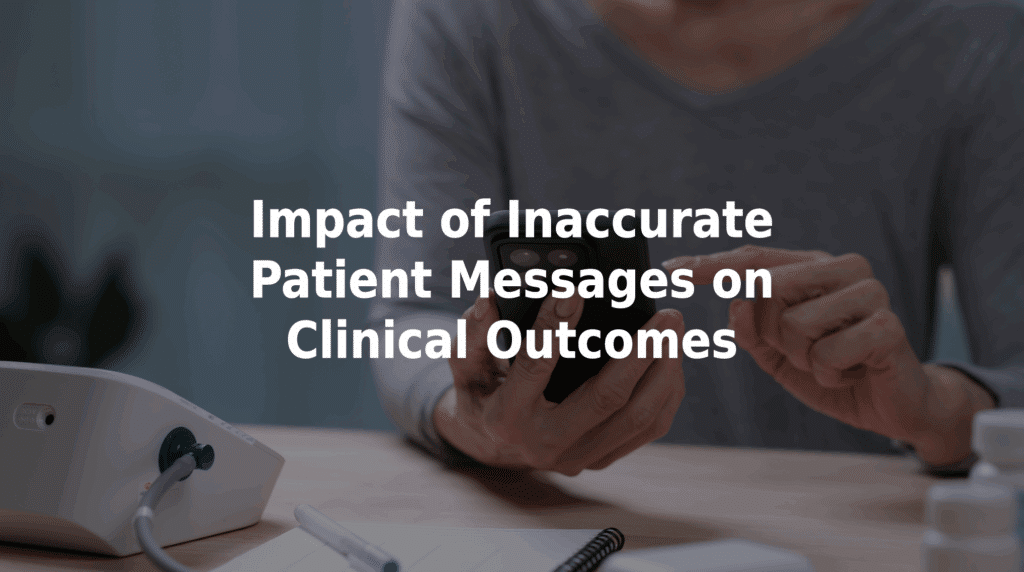Impact of Inaccurate Patient Messages on Clinical Outcomes
Clinical outcomes depend on the quality of information gathered at the first point of contact: the patient call. The impact of inaccurate patient messages on clinical outcomes is more than theoretical — it’s a daily operational risk. Missed symptoms, incomplete notes, and vague handoffs can delay treatment, compromise safety, and result in negative health outcomes.
Why Inaccuracy in Patient Message Intake Is a Serious Concern
Healthcare providers rely on accurate, complete messages to make informed decisions. When information from the patient is miscommunicated or poorly documented, the result can be:
- Delayed diagnosis and treatment.
- Unnecessary ER visits or hospitalizations.
- Poor coordination among care teams.
- Decreased patient trust and satisfaction.
- Increased liability.
It’s worth noting how one practice in Wisconsin was even sued for supposedly neglecting to respond to a patient in a timely manner.
How Inaccurate Messages Lead to Negative Outcomes
1. Escalation Failures From Missed Red Flags
Nonclinical staff may fail to identify signs of urgent conditions — such as stroke symptoms hidden within a medication request — causing providers to receive non-prioritized messages that require immediate attention.
2. Diagnostic Errors From Missing Context
If a symptom description lacks key details like onset time, severity, or progression, clinicians may misinterpret the urgency or recommend the wrong care pathway.
3. Duplicated or Contradictory Information in the EHR
When intake data is manually entered or relayed through multiple systems, there’s a greater chance of inaccuracies. Providers must spend extra time verifying details instead of focusing on care delivery.
4. Patient Dissatisfaction and Loss of Trust
When patients are asked to repeat their symptoms multiple times, or their concerns go unanswered due to documentation issues, it erodes confidence in the care team.
Real-World Example: A Message Mistaken as Routine
A patient contacted her provider to request a refill for vertigo medication. The message was logged as routine, but upon later review by a nurse manager, it was discovered that the patient was also experiencing dizziness, headache, and right-arm weakness — all potential signs of a stroke. Had the nurse not intervened, the condition could have gone untreated for hours.
This situation underscores the clinical danger of vague or incomplete message intake — particularly when handled by nonclinical personnel without a standardized process, training, or tools.
Best Practices to Prevent Inaccurate Intake
- Implement AI-Guided Intake Tools
Provide prompts that adjust based on the patient’s responses to ensure complete symptom documentation. - Standardize Documentation Across Operators
Use required fields and decision trees to remove guesswork and ensure message consistency. - Improve Oversight With Real-Time Dashboards
Allow managers to audit messages and intervene when accuracy is in question. - Streamline Patient Input With Self-Service Technology
Empower patients to submit their own concerns using structured digital channels, reducing call errors and escalating concerns directly to providers.
How MedMessage Automate Reduces Message Inaccuracy
TriageLogic’s MedMessage Automate is a chat-based intake solution that allows patients to submit their concerns to clinicians without having to wait on hold or speak with an operator. The system uses branching logic and AI prompts to guide patients through structured symptom reporting, capturing clinically relevant details that nurses can use to assess urgency.
This benefits clinical operations managers in particular by offering:
- More complete, accurate, and standardized patient messages.
- Fewer follow-ups to clarify symptoms.
- Greater detail for more-informed clinical decisions.
By collecting high-quality data at the start, MedMessage Automate helps ensure that clinical teams have what they need to deliver timely, accurate, and effective care.
Ensure the First Step in Care Is the Right One
Accurate patient messaging is essential for better outcomes. See for yourself how MedMessage Automate can improve intake quality and accuracy — not to mention save you 3-7 minutes of human capital per patient interaction!

